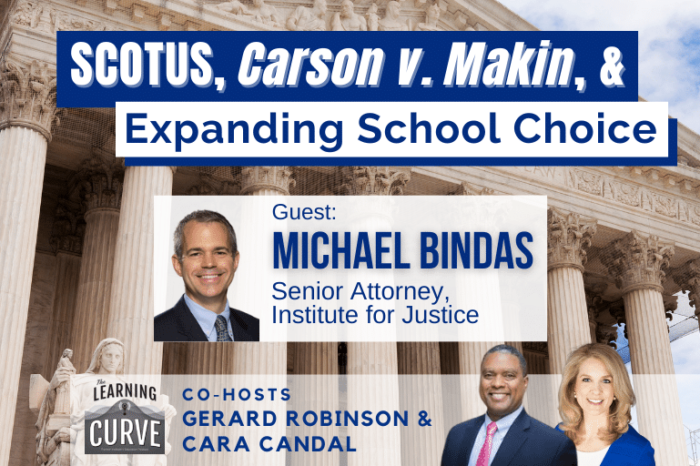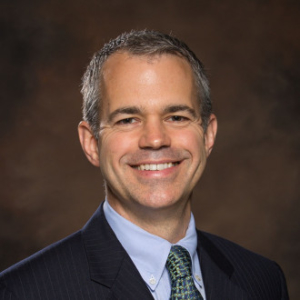The Institute for Justice’s Michael Bindas on the SCOTUS, Carson v. Makin, & Expanding School Choice
This week on “The Learning Curve,” co-hosts Cara Candal and Gerard Robinson talk with Michael Bindas, a senior attorney with the Institute for Justice (IJ). They discuss IJ’s 2020 landmark U.S. Supreme Court win in Espinoza v. Montana Department of Revenue, and its implications for state Blaine Amendments, bigoted legal barriers that have blocked religious liberty and school choice for over a century. They delve into the current legal and political status of school choice in America, at a time of unprecedented support for education savings account, education tax credit, and voucher programs. As lead counsel for the plaintiffs in the Maine school tuitioning case, Carson v. Makin, recently granted certiorari by the U.S. Supreme Court, he explains the central issues, and what another major victory could mean for religious school parents. They then turn to higher education, and Michael offers thoughts on why access to religiously-affiliated primary and secondary schooling is still viewed so differently than students attending religiously-affiliated colleges and universities through state and federal grant and loan programs.
Stories of the Week: EdWeek reports that school board meetings across the country have become increasingly rancorous as a result of growing partisanship, the lack of local news coverage, and social media – to the detriment of students’ academic success. The U.S. Department of Education announced the expansion of the Second Chance Pell program, allowing up to 200 colleges to provide prison education programs for those who have previously been unable to access federal need-based financial aid.
Guest:
Michael Bindas is a senior attorney with the Institute for Justice (IJ) and leads IJ’s educational choice team. He was part of IJ’s litigation team in Espinoza v. Montana Department of Revenue, in which the U.S. Supreme Court held the exclusion of religious options from Montana’s educational choice program unconstitutional, and he is currently IJ’s lead attorney in Carson v. Makin, challenging Maine’s exclusion of religious options from its town tuitioning program. Prior to joining IJ in 2005, Michael spent three years as an attorney with Perkins Coie. He is a former law clerk to Judge Rhesa Hawkins Barksdale of the U.S. Court of Appeals for the Fifth Circuit and served as an engineer officer in the United States Army and Pennsylvania Army National Guard before beginning his legal career. He received his undergraduate degree from the United States Military Academy and his law degree from the University of Pennsylvania.
The next episode will air on Wednesday, August 11th, 2021 at 12 pm ET with guest, Kristina Arriaga, president of Intrinsic, a strategic communications firm. She is a former vice chair of the U.S. Commission on International Religious Freedom.
Tweet of the Week:
Research shows that students do better when school has a “transcendent” religious or social purpose, rather than just preparing for a career. Great piece by @UnorthodoxMark.https://t.co/mZ2VrDRlhY via @WSJ
— Gary Rosen (@garyrosenWSJ) July 30, 2021
News Links:
U.S. Department of Education Announces It Will Expand the Second Chance Pell Experiment for the 2022-2023 Award Year
Why School Boards Are Now Hot Spots for Nasty Politics
https://www.edweek.org/leadership/why-school-boards-are-now-hot-spots-for-nasty-politics/2021/07
Get new episodes of The Learning Curve in your inbox!
Recent Posts













